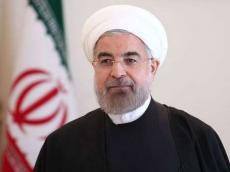|
|
TODAY.AZ / World news
Iran ready to be bridge between South Africa,Europe
25 April 2016 [15:12] - TODAY.AZ

By Aynur Karimova
Iran has expressed its readiness to be a bridge between South Africa and the countries in Central Asia, Caucasus and Russia, as well as Eastern Europe.
President of the Islamic Republic Hassan Rouhani voiced this intention at a joint press conference with his South African counterpart Jacob Zuma, adding that Iran can connect South Africa to these countries through the North-South corridor.
"Through the ports of South Africa, Iran can gain a way to the large parts of Africa, as well," Rouhani noted.
He further noted that Tehran and Pretoria enjoy significant opportunities in economy, trade and technology sectors, and the issues of cooperation in banking and transportation sectors were high on the agenda of talks held between the two presidents.
Rouhani believes that developing banking relations can take the lead in expanding the general relations between the two countries.
"We can also have a good cooperation in industry, mining and energy sectors as well," he added.
The 5,000-kilometer long North-South corridor, running from India to Helsinki, is designed to carry more than 20 million tons per year.
Being a multimodal route for transportation of passengers and cargo from Russia's St. Petersburg to the Mumbai port, the corridor is designed to carry transit cargo from India, Iran and other Persian Gulf countries to the territory of Russia (the Caspian Sea) and further - to Northern and Western Europe.
Experts say that the North-South route enjoys several advantages compared to other transport corridors; it is more profitable for each parameter than other alternative routes, such as the Suez Canal-the Mediterranean Sea-Northern Europe and the Turkmenistan-Kazakhstan-Russia-Northern Europe routes.
The preliminary estimates show that at an initial stage, it is planned to transport 6 million tons of cargo via the North-South corridor a year, and 15 to 20 million tons of cargo in the future.
Heading a high-ranking 180-member economic and politic delegation, President Zuma arrived in Tehran on April 23 at the invitation of President Rouhani.
The milestone of this visit was signing of 8 memoranda between Tehran and Pretoria.
Pretoria was one of Iran's traditional oil markets before the imposition of sanctions on the Islamic Republic due to its disputed nuclear program. Before sanctions cut down Iran's crude oil exports in June 2012, South Africa was importing on average 68,000 barrels of oil from Tehran per day.
URL: http://www.today.az/news/regions/150074.html
 Print version
Print version
Connect with us. Get latest news and updates.
See Also
- 19 December 2025 [23:23]
Australia starts arms buyback program - 19 December 2025 [22:24]
Google updates its fast ChatGPT rival - 19 December 2025 [21:22]
Toyota to sell US-made models in Japan 2026 - 19 December 2025 [20:21]
ChatGPT build-in app store - 19 December 2025 [19:21]
US suspends green card lottery - 19 December 2025 [10:00]
Peruvian artist Sol Alexo bridges cultures at Heydar Aliyev Center Exhibition - 19 December 2025 [09:00]
Legendary Mercedes-Benz designer retires - 19 December 2025 [08:00]
Ice and Snow Tourism Expo opens in China - 18 December 2025 [23:31]
President Erdo?an addresses global order, regional stability at 16th Ambassadors Conference - 18 December 2025 [22:49]
Samsung creates energy-efficient server memory for AI data centers
Most Popular
 President Erdo?an addresses global order, regional stability at 16th Ambassadors Conference
President Erdo?an addresses global order, regional stability at 16th Ambassadors Conference
 Pashinyan calls for restoration of railway links as Azerbaijani fuel shipment heads to Armenia
Pashinyan calls for restoration of railway links as Azerbaijani fuel shipment heads to Armenia
 Cotton cultivation boom links tradition with modern value-chain growth
Cotton cultivation boom links tradition with modern value-chain growth
 Azerbaijan, Netherlands highlight positive momentum in political relations
Azerbaijan, Netherlands highlight positive momentum in political relations
 President Ilham Aliyev meets with President of United Arab Emirates in Abu Dhabi
President Ilham Aliyev meets with President of United Arab Emirates in Abu Dhabi
 Prosecutor demands life imprisonment for accused war criminal
Prosecutor demands life imprisonment for accused war criminal
 Diplomacy World magazine releases special issue highlighting COP29 legacy
Diplomacy World magazine releases special issue highlighting COP29 legacy
